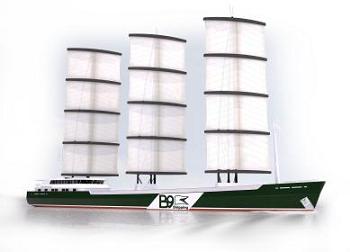Arr Harr! Swab the decks you lazy lubbers! Hoist the mainbrace, keelhaul the yardarm and pack the bilges with legal-under-maritime-law Filipino crewmen working for slave wages. Working sail is coming back to commercial shipping.
Development is underway to design the modern world's first 100 per cent fossil fuel free sailing cargo ships.
With rising fossil fuel prices and the global challenge of reducing greenhouse gas emissions, this project is set to change the shipping industry by providing efficient and affordable low-carbon shipping. The project combines proven technology, using the state of the art dyna-rig sail propulsion system with an off the shelf Rolls-Royce engine powered by waste derived liquid biomethane (liquid gas).
The ships are being developed by B9 Shipping, part of the B9 Energy group of companies, which has started work on a full-scale demonstration vessel validating the engineering and economic assumptions of the initial vessel design.
The fundamental testing programme is being conducted at the University of Southampton's Wolfson Unit for Marine Technology and Industrial Aerodynamics (WUMTIA), which has provided innovative marine technology and industrial aerodynamics expertise for over 40 years to a world-wide customer base.
Diane Gilpin, Director of B9 Shipping, says: "The shipping sector is a highly complex, interconnected system and our task has been to develop relationships with key players across the industry. Having worked previously with WUMTIA, I believe this collaboration will enable a robust, commercially and technically viable solution to be ready for scale once the engineering is proven."
Kevin Forshaw, Industry Liaison for the newly formed Southampton Marine and Maritime Institute (SMMI) at the University of Southampton, says: "Helping to develop viable means of propulsion for shipping in a post-carbon economy is a strategic objective for SMMI, and the B9 concept offers a viable alternative that we will be seeking to support at every opportunity.''
optimum performance efficiencies in a wide range of meteorological and sea conditions
The testing programme, which begins in June, will undertake tow tank and wind tunnel research to identify a basic hull design and how it interacts with the dyna-rig system. It will examine various options in the performance parameters of a B9 Ship in scale model, calibrating the thrust from the sailing rig with various hull shapes to secure optimum performance efficiencies in a wide range of meteorological and sea conditions, whilst delivering against the essential commercial (loading and discharge; port constraints) aspects.
Engineering data will be used to assess and model more accurately various economic performance scenarios: for example varying the proportion of propulsion delivered by the wind/dyna-rig relative to that provided from liquid biomethane derived from waste by B9 Shipping's sister company, B9 Organic Energy.
This economic analysis will be undertaken later in the summer once towing tank and wind tunnel testing is complete and all data has been validated.
Diane says: "We are designing B9 Ships holistically as super-efficient new builds transferring technology from offshore yacht racing combined with the most advanced commercial naval architecture. We're combining proven technologies in a novel way to develop 'ready-to-go' future-proof and 100 per cent fossil fuel free ships. This approach means financial investment and crucially, garnering support and furthering understanding with the shipping sector that there is a need for urgent change and through collaboration we can create viable commercially successful solutions."
Source: University of Southampton

The aim of art is to represent not the outward appearance of things, but their inward significance. – Aristotle

















